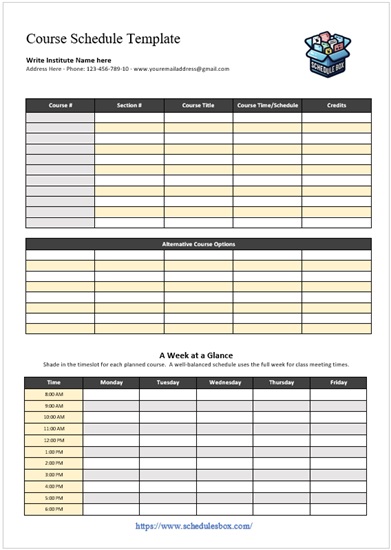Download these Free Course Schedule Templates to help you prepare your Course Schedule very easily and efficiently.
A detailed plan, known as a course schedule, outlines classes or sessions that will form part of an educational program or course in that particular period of time. It typically includes information such as:
- Course Titles: Please provide names for the courses that will be provided.
- Instructor Names: Each course lists the instructors or professors imparting them.
- Class Times: Determines the specific days of the week and the exact time each lesson will commence.
- Locations: Is the actual or physical place both physical and virtual in which education can take place.
- Course Codes: The unique identifiers used to classify courses by the institution.
- Credits: This indicates the amount of credit a course carries and may therefore influence the workload and significance it assumes within an academic schedule.
- Prerequisites: Enumerate eligibility criteria for enrollment in a teaching program.
To students and faculty, it is crucial to have a plan for all the time they will be spending on academic matters to ensure that their academic timetables are not in conflict. Administrative duties like room allocation and enrolment monitoring also rely on timetables.
Free Course Schedule Templates
Here is a collection of free Course Schedule Templates that I have created using MS Word for our valued visitors.
Types of Course Schedules
Depending on the educational institution, the level of study, and the format of courses offered, there might be a great difference in course schedules. Here are some common types of course schedules:
- Block Schedule: Classes don’t meet often but when they do it’s for long periods, maybe even as long as two hours, which makes it possible to delve deep into a subject each time you meet.
- Traditional Schedule: It’s merely an everyday event for classes to meet on a regular basis, often two or three times weekly for shorter durations usually 50 minutes or an hour and a half.
- Modular Schedule: Courses are moderated by modules, which can last from a few weeks to a semester. This setup enables students to delve deeper into a topic before proceeding to the next.
- Rotating/Alternating Schedule: The schedule changes as per day or week while rotating through a sequence which allows for each course to have different class times and days on. It enables avoiding conflicts between different schedules besides enabling individuals to balance their loads across different days.
- Hybrid Schedule: Online and face-to-face courses are mixed together. Some classes require students to attend in person while for others one can only participate through the internet.
- Compressed or Intensive Schedule: Courses usually finished in lesser time spans than usual. This might be summer courses or special intensive sessions that span only a few weeks but are more frequent in meetings.
- Evening or Weekend Schedule: This course is specifically for non-traditional students who are possibly working during the day. The lessons are in the evenings or at weekends.
- Asynchronous Schedule: The lack of designated meeting times makes learning materials and lectures accessible at all times in online education.
- Open Schedule: It is very flexible. You can start and finish a course while moving at your rate within a given period of time, usually with no specific meeting times.
Every teaching style, course content, and student requirements are taken care of by varied types of schedules, which provide an assortment of flexibility levels as well as structural arrangement.
Critical Importance of Course Schedules
Educational establishments rely deeply on program schedules, and this way of organizing courses deeply affects both lecturers, students, and staff in many ways. Here are some reasons why course schedules are critically important:
- Maximizing Resource Utilization: Efficient use of classrooms, laboratories, and other institutions’ resources is the importance of proper scheduling. It ensures that they are not overbooked or underused thus making good use of them for schooling.
- Conflict Avoidance: Careful planning of course schedules by educational institutions prevents clashes in class timings that are vital for students as well as faculty hence, making sure that learners do not have to compromise over the classes they want to attend as lecturers effectively juggle between teaching and research tasks.
- Academic Success: A course schedule that is organized well helps students to divide their academic responsibilities with school and family personal obligations, making it important to ensure good stress levels and overall fitness. This allows students to prepare for their studies productively hence increasing performance in school.
- Strategic Enrollment Management: Managing enrollment effectively is closely dependent on course schedules which make sure there are appropriate number of sections of courses needed by students such that overcrowding is avoided resulting in an optimal student-teacher ratio and better experiences in learning.
- Facilitating Completions: Efficient scheduling helps students complete their degrees and certificates on time by allowing them to take necessary classes without delays. This is especially important for programs with courses offered in a sequence or required prerequisites.
- Accessibility and Flexibility: For non-traditional students, such as working adults or parents, flexible scheduling (like evening, weekend, or online classes) is essential. It allows these students to continue their education without sacrificing their job or family responsibilities.
- Adaptability to Changing Educational Needs: Reacting to evolving educational terrains and preserving academic programs’ competitiveness and relevance demands dynamic scheduling that promptly adjusts to changes, for example, shifts in student demand, new course offerings or faculty availability.
- Student Retention: A relevant timetable enables student’s better satisfaction and retention. Most likely students would pursue higher education in institutions whose timetable fits their demands thereby facilitating the easy accomplishment of their educational goals.
In general, course schedules that are meticulously thought out and carried out are at the heart of the smooth running of educational facilities, student success, and satisfying people working as lecturers.











